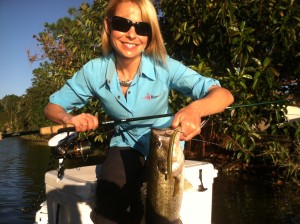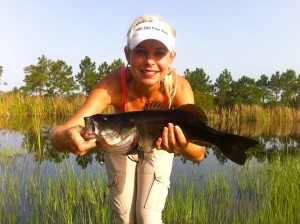What Color is Your Largemouth Bass?
By Debbie Hanson
Feb 03, 2014
Olive, dark green, brown… largemouth bass can change color a bit like a chameleon if you pay close enough attention.
Olive, dark green, brown… largemouth bass can change color a bit like a chameleon if you pay close enough attention. It's true, if you've been bass fishing for any length of time, you might have noticed that largemouth bass can often appear different shades of green and brown or may have a more or less pronounced lateral line. Yep, bass can be somewhat like that quiet, studious guy (or girl) you dated from your high school math class -- kind of boring at first, but once you get to know them, they are pretty amazing.

The next time you catch and release a largemouth, take a quick second to really admire the unique physical characteristics of the fish as you hold it horizontally in the water. Does the color seem to be an indicator of its habitat or the water conditions? Maybe you've caught bass in different areas of the same lake or pond, but noticed that the fish appeared to be either lighter or darker in color.

If you've ever wondered how or why this color change occurs, here is some insight:
-
According to the US Department of Energy's "Ask a Scientist!" Program, bass have receptors in their eyes that detect varying levels of light and cue changes in the pigment cells of the skin. The fish's eyes receive reflected light from its surroundings and this often triggers a hormonal release in the skin to either move the pigment closer to the surface of the skin or further away.
-
Due to this shift in pigment, largemouth bass can camouflage themselves when ambushing prey or when being pursued by a predator. If they are in clear water with plenty of weeds or cover, they usually have darker or clearer markings. When they are found out in deep water or even shallow muddy water, the pigment moves further away from the skin and can take on a faded or bleached out appearance.
As you learn more about fish behavior and biology, think about the ways in which habitat or instincts might come into play when targeting species like the largemouth bass. The best bass fishing tips come from anglers who, no matter how many years of experience, consider themselves to be perpetual students when on the water.









